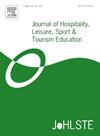酒店金融中的模拟游戏:在紧急远程教学中加强参与和学习
IF 4.1
2区 教育学
Q1 EDUCATION & EDUCATIONAL RESEARCH
Journal of Hospitality Leisure Sport & Tourism Education
Pub Date : 2025-09-05
DOI:10.1016/j.jhlste.2025.100575
引用次数: 0
摘要
本文以酒店管理学院的远程学习课程为背景,考察了基于游戏的学习对学生学习的影响。在课程中,使用了两个与学习成果相一致的模拟游戏。我们的数据包括参与模拟的信息、学生在模拟后的即时反馈、他们的考试成绩和之后进行的面试。我们的研究结果表明,游戏提高了学生的兴趣和参与度,缩小了在线学习和面对面学习之间的差距,并提高了考试成绩。该研究还强调了基于游戏的学习方式在适应不同学习风格方面的潜力。本文章由计算机程序翻译,如有差异,请以英文原文为准。
Simulation games in hospitality finance: Enhancing engagement and learning during emergency remote teaching
This article examines the impact of game-based learning on student learning in the context of a distance learning course in a hospitality school. During the course, two simulation games aligned to learning outcomes were used. Our data includes information on participation in the simulation, student feedback immediately after the simulation, their exam results and interviews conducted afterwards. Our results show that the games increased student interest and engagement, reduced the gap between online and face-to-face learning, and led to improved exam performance. The study also highlights the potential of game-based learning to adapt to different learning styles.
求助全文
通过发布文献求助,成功后即可免费获取论文全文。
去求助
来源期刊
CiteScore
8.10
自引率
10.80%
发文量
41
审稿时长
42 days
期刊介绍:
The Journal of Hospitality, Leisure, Sport and Tourism Education (JoHLSTE) is the leading international, peer-reviewed educational journal for this subject grouping. Its aims are to: a) Promote, enhance and disseminate research, good practice and innovation in all aspects of higher education in Hospitality, Leisure, Sport and Tourism and Events to its prime audience including teachers, researchers, employers, and policy makers. b) Encourage greater understanding, links and collaboration across its constituent fields. JoHLSTE is designed to have maximum impact through it being available on-line, fully archived and peer-reviewed. JoHLSTE is divided into seven sections: Editorial; Academic Papers; Practice Papers, Perspectives, Comments and Rejoinders, Research Notes and Reports and Education Resource Reviews.

 求助内容:
求助内容: 应助结果提醒方式:
应助结果提醒方式:


